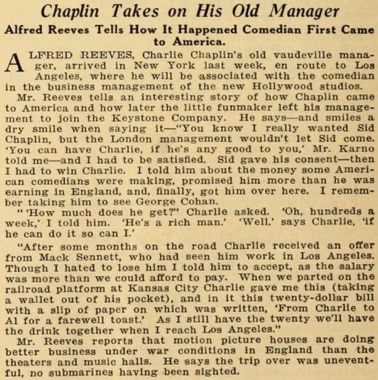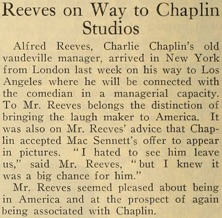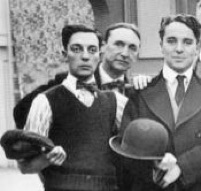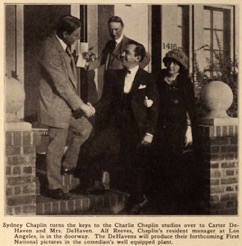A Dog‘s Life Clippings 34/146
Moving Picture World, New York, January 19, 1918.
Alfred Reeves (left Buster Keaton, right Charles Chaplin)
at Balboa Amusement Producing Company
studio, Long Beach, California, circa 1918, detail
& Sydney Chaplin turns the keys to the
Charlie Chaplin studios over to Carter DeHaven and Mrs.
DeHaven. Alf Reeves, Chaplin‘s resident manager
at Los Angeles, is in the doorway. The DeHavens will produce
their forthcoming First National pictures in the comedian‘s
well equipped plant.
(...) Photo, Exhibitors Herald, Nov. 6, 1920
& Reeves on Way to Chaplin Studios
Alfred Reeves, Charlie Chaplin‘s old vaudeville manager,
arrived in New York from London last week on his way
to Los Angeles where he will be connected with the comedian
in a managerial capacity. To Mr. Reeves belongs the
distinction of bringing the laugh maker to America. It was also
Mr. Reeves‘ advice that Chaplin accepted Mac Sennett‘s
offer to appear in pictures. „I hated to see him leave us,“ said
Mr. Reeves, „but I knew it was a big chance for him.“
Mr. Reeves seemed pleased about being in America and
at the prospect of again being associated with Chaplin.
(...) Motion Picture News, Jan. 19, 1918
„No submarines having been sighted“
Editorial content. „Chaplin Takes on His Old Manager
Alfred Reeves Tells How It Happened Comedian First
Came to America.
ALFRED REEVES, Charlie Chaplin‘s old vaudeville
manager, arrived in New York last week, en route
to Los Angeles, where he will be associated with the comedian
in the business management of the new Hollywood
studios.
Mr. Reeves tells an interesting story of how Chaplin came
to America and how later the little fun maker left his
management to join the Keystone Company. He says – and
smiles a dry smile when saying it – ,You know I really
wanted Sid Chaplin, but the London management wouldn‘t
let Sid come. ,You can have Charlie, if he‘s any good
to you,‘ Mr. Karno told me – and I had to be satisfied. Sid gave
his consent – then I had to win Charlie. I told him about
the money some American comedians were making, promised
him more than he was earning in England, and, finally,
got him over here. I remember taking him to see George Cohan.
,How much does he get?‘ Charlie asked. ,Oh. hundreds
a week,‘ I told him. ,He‘s a rich man.‘ ,Well,‘ says Charlie, ,if he
can do it so can i.‘
,After some months on the road Charlie received an offer
from Mack Sennett, who had seen him work in Los
Angeles. Though I hated to lose him I told him to accept,
as the salary was more than we could afford to pay.
When we parted on the railroad platform at Kansas City Charlie
gave me this (taking a wallet out of his pocket), and
in it this twenty-dollar bill with a slip of paper on which was
written, ,From Charlie to Al for a farewell toast.‘
As I still have the twenty we‘ll have the drink together when
I reach Los Angeles.‘
Mr. Reeves reports that motion picture houses are doing
better business under war conditions in England than
the theaters and music halls. He says the trip was uneventful,
no submarines having been sighted.“
Redaktioneller Inhalt




